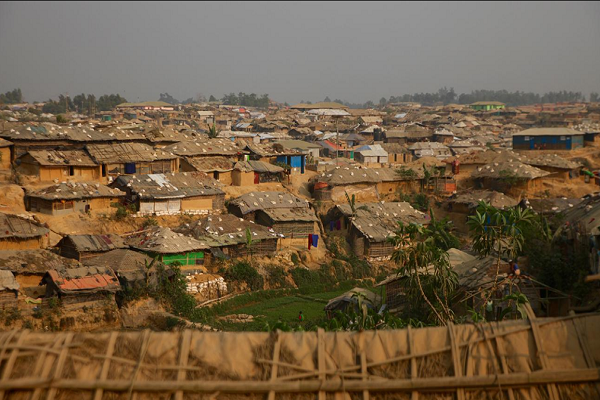Rohingya Refugees in Cox's Bazar Camps Exposed to the Elements

A Red Cross Red Crescent survey found that 82 percent of the 700,000 people in the sprawling camps urgently need sturdier shelters to protect them from extreme temperatures, monsoon downpours and two cyclone seasons a year, the Daily Star reported.
Housing conditions of the Rohingya Muslims at the camps are basic and after 18 months they have dramatically deteriorated, leaving them worryingly exposed to disasters.
Azmat Ulla, head of the IFRC country office in Bangladesh, said the aid community in Cox's Bazar needs to prioritise repairing and replacing the battered shelters so that people have some protection against the elements, and are provided with at least some basic comfort and dignity, according to a statement issued Monday.
In recent weeks, Red Crescent staff members and volunteers have distributed tarpaulins, ropes and tools to 49,000 families benefitting 200,000 people. They have so far trained 8,400 people to make their shelters safer, while arranging more training is underway.
Feroz Salah Uddin, secretary general of the Bangladesh Red Crescent, said, “Our trained technicians are helping camp residents improve their own shelters. This is especially important for people with disabilities, the elderly as well as female and child-headed households.”
Ahead of the cyclone season in April and May, the Bangladesh Red Crescent and the government agencies are also training thousands of volunteers from the Rakhine community in cyclone preparedness.
However, all the cyclone preparedness training, well-rehearsed emergency drills and necessary equipment in the world would fail if a deadly tropical cyclone barrels up the Bay of Bengal like in the past, Feroz observed.
Azmat Ulla of the IFRC said, “The fact remains that these people have nowhere to evacuate to.
“The pitiful state of people's shelters illustrates how utterly unsustainable and unsafe this life is. We continue to call for an urgent political solution to this crisis. But in the meantime, more is needed to at least provide people with basic comfort and dignity.”
The Rohingya are considered the world’s most persecuted minority, attacked and driven out of their native Rakhine State in northwestern Myanmar in what United Nations (UN) investigators have said remains an “ongoing genocide.”
The Rohingya Muslims were subjected to a campaign of killings, rape, arbitrary arrests, and arson attacks by the military and Buddhist mobs in Rakhine mainly between late 2016 and August 2017.
The brutal campaign forced some 700,000 Rohingya to flee their homeland since August 2017 and seek refuge in neighboring Bangladesh. There, they are confined to squalid, overcrowded camps.



